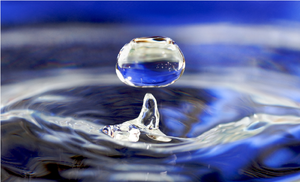Difference between revisions of "Water"
| Line 45: | Line 45: | ||
: At 100°C water boils and turns into [[steam]]. | : At 100°C water boils and turns into [[steam]]. | ||
: [[Water]] [[Chemical Reaction|react]]s with [[metal]]s above [[Hydrogen]] on the [[Reactivity Series|reactivity series]] to produce [[Metal Hydroxide]]s which are [[alkali]]ne. | : [[Water]] [[Chemical Reaction|react]]s with [[metal]]s above [[Hydrogen]] on the [[Reactivity Series|reactivity series]] to produce [[Metal Hydroxide]]s which are [[alkali]]ne. | ||
| − | |||
| − | |||
| − | |||
===References=== | ===References=== | ||
| Line 56: | Line 53: | ||
:[https://www.amazon.co.uk/gp/product/0198359381/ref=as_li_tl?ie=UTF8&camp=1634&creative=6738&creativeASIN=0198359381&linkCode=as2&tag=nrjc-21&linkId=47c8d1ae58d8b3a5e2094cd447154558 ''Water, pages 44-45, GCSE Chemistry; Third Edition, Oxford University Press, AQA ''] | :[https://www.amazon.co.uk/gp/product/0198359381/ref=as_li_tl?ie=UTF8&camp=1634&creative=6738&creativeASIN=0198359381&linkCode=as2&tag=nrjc-21&linkId=47c8d1ae58d8b3a5e2094cd447154558 ''Water, pages 44-45, GCSE Chemistry; Third Edition, Oxford University Press, AQA ''] | ||
:[https://www.amazon.co.uk/gp/product/0008158762/ref=as_li_tl?ie=UTF8&camp=1634&creative=6738&creativeASIN=0008158762&linkCode=as2&tag=nrjc-21&linkId=a0fffa35b3ea49a63404f6704e0df7cc ''Water, pages 59, 64-5, 72, 99, GCSE Chemistry; Student Book, Collins, AQA ''] | :[https://www.amazon.co.uk/gp/product/0008158762/ref=as_li_tl?ie=UTF8&camp=1634&creative=6738&creativeASIN=0008158762&linkCode=as2&tag=nrjc-21&linkId=a0fffa35b3ea49a63404f6704e0df7cc ''Water, pages 59, 64-5, 72, 99, GCSE Chemistry; Student Book, Collins, AQA ''] | ||
| + | |||
| + | ====Edexcel==== | ||
| + | |||
| + | :[https://www.amazon.co.uk/gp/product/1292120215/ref=as_li_tl?ie=UTF8&camp=1634&creative=6738&creativeASIN=1292120215&linkCode=as2&tag=nrjc-21&linkId=8f96ddb76196848bafdb124354e4cf77 ''Water; distillation, pages 10, 14, GCSE Chemistry, Pearson, Edexcel ''] | ||
| + | :[https://www.amazon.co.uk/gp/product/1292120215/ref=as_li_tl?ie=UTF8&camp=1634&creative=6738&creativeASIN=1292120215&linkCode=as2&tag=nrjc-21&linkId=8f96ddb76196848bafdb124354e4cf77 ''Water; for chemical analysis, page 14, GCSE Chemistry, Pearson, Edexcel ''] | ||
| + | :[https://www.amazon.co.uk/gp/product/1292120215/ref=as_li_tl?ie=UTF8&camp=1634&creative=6738&creativeASIN=1292120215&linkCode=as2&tag=nrjc-21&linkId=8f96ddb76196848bafdb124354e4cf77 ''Water; for drinking, pages 14-15, GCSE Chemistry, Pearson, Edexcel ''] | ||
| + | |||
| + | ==Beyond the Curriculum== | ||
| + | {{#ev:youtube|https://www.youtube.com/watch?v=RwtO04EXgUE}} | ||
Revision as of 17:00, 29 November 2019
Contents
Key Stage 1
Meaning
Water is a transparent liquid needed by all life on Earth.
About Water
- Water is can be used to wash clothes because it is a liquid.
- Water flows down rivers and into the sea because it is a liquid.
- If water gets too hot it turns into steam.
- If water gets too cold it becomes ice.
Key Stage 2
Meaning
Water is a transparent liquid needed by all life on Earth.
About Water
- Water can be frozen into ice if it is cooled down below 0°C.
- Water evaporates into water vapour.
- The higher the temperature the quicker water evaporates.
- At 100°C water boils and turns into steam.
Key Stage 3
Meaning
Water is a liquid (at room temperature) chemical compound with the chemical formula H2O.
About Water
- Water can be frozen into ice if it is cooled down below 0°C.
- Water evaporates into water vapour.
- The higher the temperature the quicker water evaporates.
- At 100°C water boils and turns into steam.
- Water reacts with metals above Hydrogen on the reactivity series to produce Metal Hydroxides which are alkaline.
Key Stage 4
Meaning
Water is a liquid (at room temperature) chemical compound with the chemical formula H2O.
About Water
- Water can be frozen into ice if it is cooled down below 0°C.
- Water evaporates into water vapour.
- The higher the temperature the quicker water evaporates.
- At 100°C water boils and turns into steam.
- Water reacts with metals above Hydrogen on the reactivity series to produce Metal Hydroxides which are alkaline.
References
AQA
- Water, page 85, GCSE Physics; Third Edition, Oxford University Press, AQA
- Water, pages 262-3, GCSE Biology, Hodder, AQA
- Water, pages 44-45, GCSE Chemistry; Third Edition, Oxford University Press, AQA
- Water, pages 59, 64-5, 72, 99, GCSE Chemistry; Student Book, Collins, AQA
Edexcel
- Water; distillation, pages 10, 14, GCSE Chemistry, Pearson, Edexcel
- Water; for chemical analysis, page 14, GCSE Chemistry, Pearson, Edexcel
- Water; for drinking, pages 14-15, GCSE Chemistry, Pearson, Edexcel
